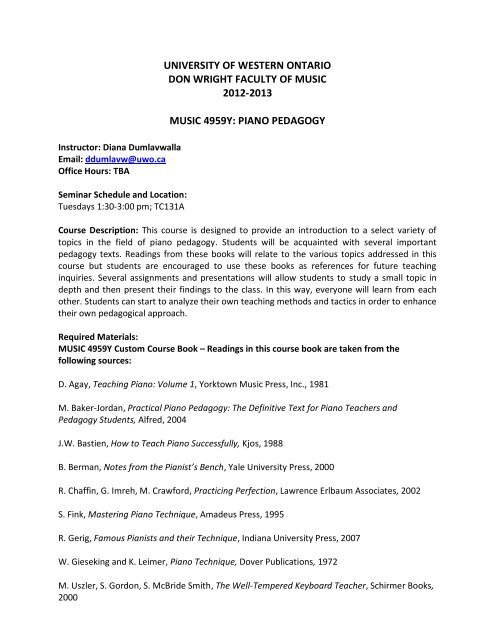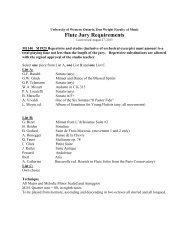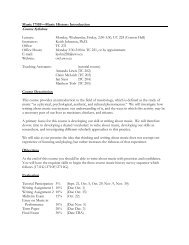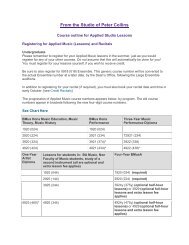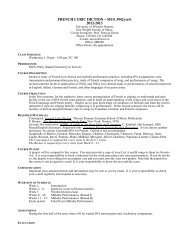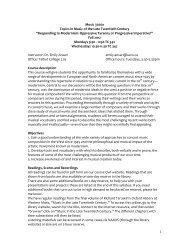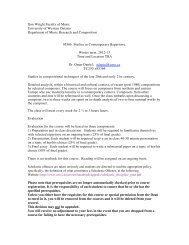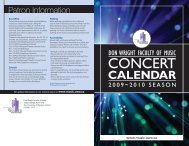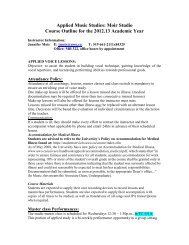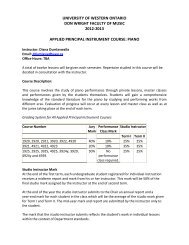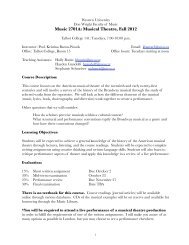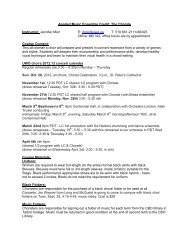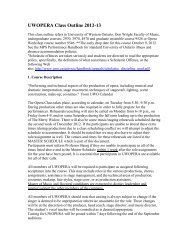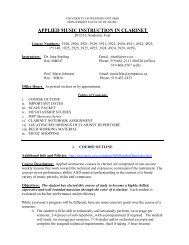Music 49459y Piano Pedagogy Outline 2012-13.pdf - Don Wright ...
Music 49459y Piano Pedagogy Outline 2012-13.pdf - Don Wright ...
Music 49459y Piano Pedagogy Outline 2012-13.pdf - Don Wright ...
You also want an ePaper? Increase the reach of your titles
YUMPU automatically turns print PDFs into web optimized ePapers that Google loves.
Instructor: Diana DumlavwallaEmail: ddumlavw@uwo.caOffice Hours: TBASeminar Schedule and Location:Tuesdays 1:30-3:00 pm; TC131AUNIVERSITY OF WESTERN ONTARIODON WRIGHT FACULTY OF MUSIC<strong>2012</strong>-2013MUSIC 4959Y: PIANO PEDAGOGYCourse Description: This course is designed to provide an introduction to a select variety oftopics in the field of piano pedagogy. Students will be acquainted with several importantpedagogy texts. Readings from these books will relate to the various topics addressed in thiscourse but students are encouraged to use these books as references for future teachinginquiries. Several assignments and presentations will allow students to study a small topic indepth and then present their findings to the class. In this way, everyone will learn from eachother. Students can start to analyze their own teaching methods and tactics in order to enhancetheir own pedagogical approach.Required Materials:MUSIC 4959Y Custom Course Book – Readings in this course book are taken from thefollowing sources:D. Agay, Teaching <strong>Piano</strong>: Volume 1, Yorktown <strong>Music</strong> Press, Inc., 1981M. Baker-Jordan, Practical <strong>Piano</strong> <strong>Pedagogy</strong>: The Definitive Text for <strong>Piano</strong> Teachers and<strong>Pedagogy</strong> Students, Alfred, 2004J.W. Bastien, How to Teach <strong>Piano</strong> Successfully, Kjos, 1988B. Berman, Notes from the Pianist’s Bench, Yale University Press, 2000R. Chaffin, G. Imreh, M. Crawford, Practicing Perfection, Lawrence Erlbaum Associates, 2002S. Fink, Mastering <strong>Piano</strong> Technique, Amadeus Press, 1995R. Gerig, Famous Pianists and their Technique, Indiana University Press, 2007W. Gieseking and K. Leimer, <strong>Piano</strong> Technique, Dover Publications, 1972M. Uszler, S. Gordon, S. McBride Smith, The Well-Tempered Keyboard Teacher, Schirmer Books,2000
UNIVERSITY STATEMENTSAccommodation for Medical IllnessPlease refer to www.uwo.ca/univsec/handbook/appeals/accommodation_medical.pdf whichstates the University’s new policy on Accommodation for Medical Illness.“In order to ensure fairness and consistency for all students, academic accommodation forwork representing 10% or more of the student’s overall grade in the course shall be grantedonly in those cases where there is documentation indicating that the student was seriouslyaffected by illness and could not reasonably be expected to meet his/her academicresponsibilities. Documentation shall be submitted, as soon as possible, to the appropriatedean’s office…” (In <strong>Music</strong>, this means the Associate Dean, Undergraduate).Medical HealthStudents that are in emotional/mental distress should refer to Mental Health@Westernhttp://www.uwo.ca/uwocom/mentalhealth/ for a complete list of options about how to obtainhelp.Scholastic OffencesScholastic offences are taken seriously and students are directed to read the appropriate policy,specifically, the definition of what constitutes a Scholastic Offence, as found at:http://www.uwo.ca/univsec/handbook/appeals/scholastic_discipline_undergrad.pdfAll required papers may be subject to submission for textual similarity review to thecommercial plagiarism detection software under license to the University for the detection ofplagiarism. All papers submitted for such checking will be included as source documents in thereference database for the purpose of detecting plagiarism of papers subsequently submittedto the system. Use of the service is subject to the licensing agreement, currently between TheUniversity of Western Ontario and Turnitin.com http://turnitin.uwo.ca/.
Fall TermDate Topics Description/Discussion Assignments Due for this ClassSept. 11 Introduction Getting to know you, orientationto the courseSept. 18 Learning styles Exploring the effect ofpersonality on learning styles;Forming the right kind ofconnection with each individualstudentSept. 25Oct. 2TeachingbeginnersTeachingbeginnersAudiation, production of sound,on the path to a sound and solidtechniqueThe first 6 months of lessons;Avoiding injury – instilling goodhabits; pacing lessonsOct. 9 Analysis of Primers A variety of primer methods willbe analyzed in class. Students willgain familiarity with thesepublications and discuss thestrengths and weaknesses ofeach example.Oct. 16 Analysis of Primers A variety of primer methods willbe analyzed in class. Students willgain familiarity with thesepublications and discuss thestrengths and weaknesses ofOct. 23Oct. 30Nov. 6ElementaryRepertoireElementaryRepertoireChoosingrepertoireeach example.Student presentations – identifykey pedagogical elements andperformance practice issues intwo elementary level piecesStudent presentations – identifykey pedagogical elements andperformance practice issues intwo elementary level piecesMatching students withrepertoire that highlight theirstrengths and provide challengesRead: Baker-Jordan p 73-82 HowStudents Learn; p 149-166Staying in Tune with LearningStyles; Uszler/Gordon/Smith p239-263 Putting Theory intoPracticeRead: Gieseking/Leimer p 9-12Training of the <strong>Music</strong>al Ear;Sandor p 3-9 <strong>Music</strong>, Motions andEmotionsRead: Bastien p 104-105 onReading and Note Recognition;Gieseking/Leimer p 113 Legato;Fink p 53-70 Movements Shapedby the <strong>Piano</strong>Read: Bastien p. 39-77 Survey ofMethods for BeginnersHalf of the class will make theirpresentationsThe other half of the class willmake their presentations
Nov. 13Nov. 20Nov. 27Dec. 4Teachingbeginning andelementarystudentsTeachingbeginning andelementarystudentsPrimerspresentationPrimerspresentationPractical experience – teachingyoung children.Practical experience – teachingyoung children.Each student will present his/herprimer to the classEach student will present his/herprimer to the classWinter TermWeek Topics Description/Discussion Assignments Due for this ClassJan. 8 Business of <strong>Music</strong>TeachingAttracting students, dealing withfinancial issues, scheduling, otherpractical tips for organizing astudioJan. 15 Schools of <strong>Piano</strong>TechniqueA historical overview of the RussianSchoolJan. 22 Schools of <strong>Piano</strong> A historical overview of the FrenchTechnique SchoolJan. 29 Schools of <strong>Piano</strong> A historical overview of the EnglishTechnique SchoolFeb. 5 Fingering Discussion of the principles offingering, fingering patterns andindividual preferences withpractical applicationsFeb. 12 Sight Reading/Ear Acquiring these crucial skills at theTrainingelementary, intermediate andFeb. 26(Feb. 18 isReadingweek!)Mar. 5Teaching theoryIntermediateRepertoireadvanced levels.How to structure a course; efficientgroup teaching of theory; review oftheory texts; connecting it to therepertoire!Student presentations – identifykey pedagogical elements andperformance practice issues in twointermediate level piecesRead Baker-Jordan p 17-49 TheBusiness of <strong>Piano</strong> TeachingMajor Assignment: Due at theend of the term - create a studiopolicy. This type of documentwill be discussed in class today.Read: Gerig p 287-314,Read: Gerig p 315-328 andRead: Gerig p 361-406Read: Bastien p 247-269 AGuide to <strong>Piano</strong> Fingering byRobert RouxRead Agay p 197-218 SightReading: The Basics, Step byStepRead: Agay, p 157-173 Theory:The Basis of <strong>Music</strong>ianshipRead: Berman p 3-23 Soundand Touch, p 53-74 Articulationand Phrasing, p 97-111 PedalingHalf of the class will make their


